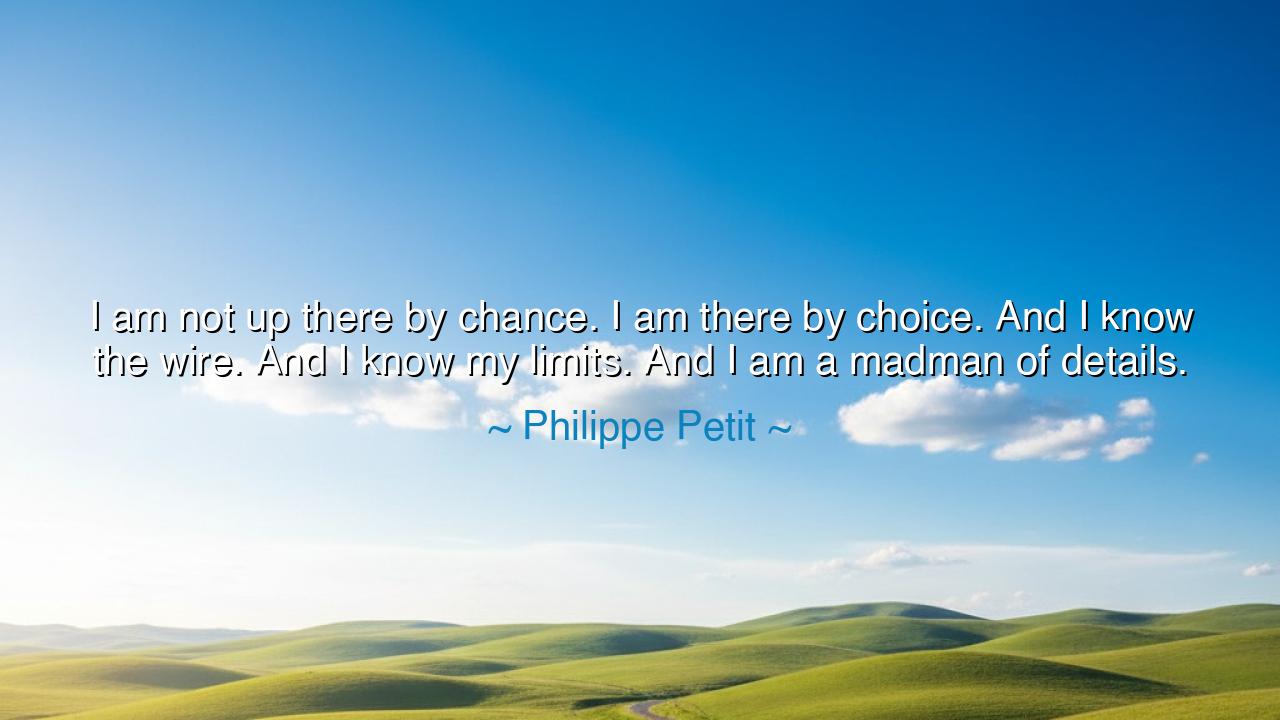
I am not up there by chance. I am there by choice. And I know the
I am not up there by chance. I am there by choice. And I know the wire. And I know my limits. And I am a madman of details.






In the pursuit of greatness, there are few feats more daring, more breathtaking, than that of Philippe Petit, the man who defied gravity and reason by walking between the Twin Towers of the World Trade Center on a highwire. His bold claim, "I am not up there by chance. I am there by choice. And I know the wire. And I know my limits. And I am a madman of details," encapsulates a profound truth about human will, purpose, and the mastery of one’s craft. Petit’s words are a testament to the fact that true achievement is not simply the result of fate, nor of luck, but of intentionality, dedication, and an unwavering commitment to the details that others might overlook. To stand on that wire was not a mere accident, but a decision, one made with purpose and a deep understanding of the risks and challenges involved.
From the earliest days of human history, greatness was often not ascribed to the lucky or the fortunate, but to those who made deliberate choices to overcome the impossible. The ancient heroes, whether Hercules, Achilles, or Odysseus, were not simply men of strength or skill; they were men of purpose. Hercules did not choose his labors by accident; they were the result of his own decisions, his commitment to the gods and the fate that had been cast for him. Like Petit, these heroes understood that true greatness requires not only the willingness to face danger and unknowns, but to embrace them with knowledge, discipline, and a precise awareness of one's limits.
Petit’s choice to walk the wire, to dance with danger hundreds of feet above the ground, speaks to the same courage and discipline that Homer immortalized in the story of Odysseus. Odysseus, in his long journey home, was often faced with immense risks and temptations. Yet, what set him apart from others was his wisdom and his awareness of his limits. In the face of the Sirens' song, Odysseus knew that to listen to their call would be to destroy himself and his crew. He bound himself to the mast, choosing to resist the temptation, just as Petit chose, moment by moment, to walk the wire. Like Odysseus, Petit did not blindly charge into the unknown, but understood the risk, the craft, and the sacrifice required to achieve greatness.
The essence of Petit’s statement, "I know the wire. I know my limits," speaks directly to the ancient ideal of self-awareness. The greatest of warriors and thinkers understood that true strength comes not from blind ambition or reckless action, but from the mastery of one’s own abilities and limitations. Take the philosophers of ancient Greece, such as Aristotle, who believed that virtue lies in the balance between excess and deficiency. To walk the wire is not to take mindless risks, but to understand exactly where the edge lies and to navigate it with precision and care. Petit, in his words, reveals that the key to his success lies in his deliberate understanding of both the wire and his own capacity. The act is not random, but a finely tuned balance between courage and wisdom.
In the modern age, many are drawn to extreme feats and daring pursuits, often unaware of the details that make such accomplishments possible. But Petit’s mastery is a reminder to us all: it is not enough to simply desire greatness; one must be willing to pay the price of study, preparation, and focus. He did not walk the wire without hours of practice, without understanding the very physics of balance, nor without a complete understanding of his environment. Just as the great warriors of old spent years honing their craft before stepping into battle, so too did Petit. This is not the act of a madman in the reckless sense, but of a man driven by a deep and consuming dedication to his craft, a madness of detail that allowed him to achieve the impossible.
The lesson from Petit’s words is clear: greatness does not come by chance, nor by idle dreaming. It is the result of choosing to face the difficult, the dangerous, and the seemingly impossible, but always with an understanding of what is required to succeed. Like Petit, we must choose to dedicate ourselves to our passions, to study and prepare with the utmost precision, and to act with courage and self-awareness. Whether you are an artist, a thinker, a leader, or a dreamer, the path to greatness requires not only the boldness to step forward but the wisdom to know what it takes to succeed.
Thus, in your own life, remember that each act of greatness begins with a choice—a choice to confront the difficult and the unknown with discipline and clarity. Like Philippe Petit, embrace your limits and your craft, for it is in the details that success is made. Every path you choose will require both courage and understanding, so stand firm, study the wire before you, and remember: greatness is not a gift from the gods but the product of the choices you make, the risks you take, and the details you master.






AAdministratorAdministrator
Welcome, honored guests. Please leave a comment, we will respond soon